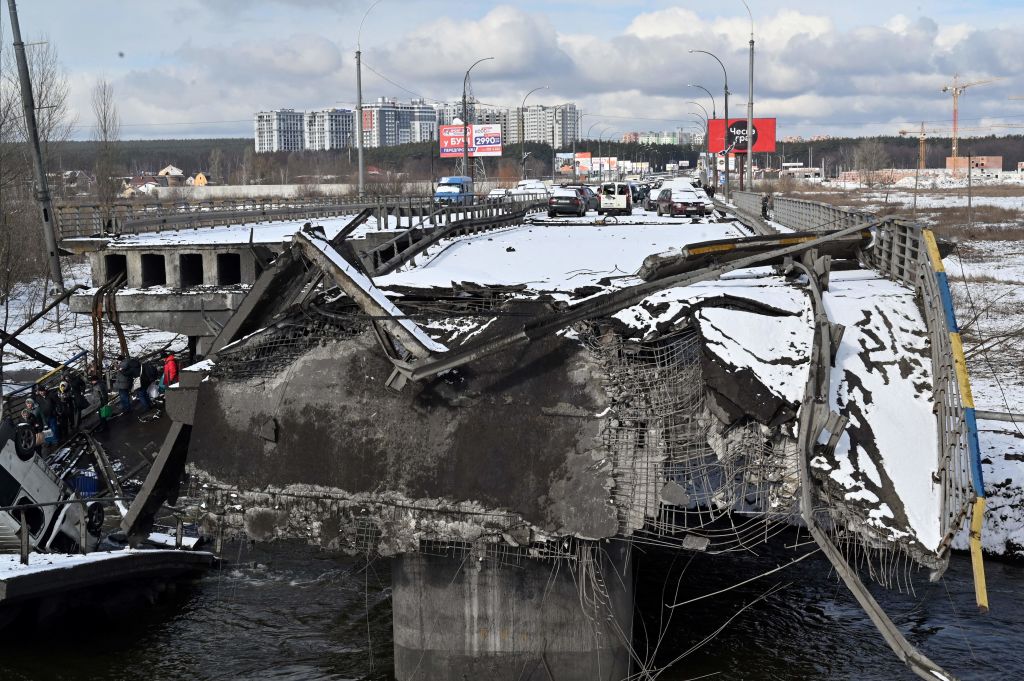
As world leaders attempt to isolate and punish Russia with sanctions and trade bans for its invasion of Ukraine, a handful of American academics are pushing a more unconventional idea: the United States and Europe should offer refuge to Russian soldiers who defect and surrender.
Peter Schuck, a former Yale Law School professor, and Ilya Somin, a George Mason University’s Anontin Scalia Law School, each published op-eds on the subject—in The Wall Street Journal and The New York Times, respectively—and Timur Kuran, an economist at Duke University tweeted the idea on Feb. 26. “Don’t assume Russian soldiers and officers like what they are doing,” he wrote. “Some…must be willing to break ranks, if only they have options. Let [European Union] and NATO countries offer asylum to Russian military defectors.”
Michelle Mittelstadt, director of communications at the Migration Policy Institute, a nonpartisan research institution, says it’s an idea countries should consider. “Countries should certainly offer safe harbor to Russians who run afoul of the Russian government and have protection needs,” she says.
How exactly it would work is another question.
Offering this type of protection would most likely have to happen in Europe, not the U.S., Mittelstadt says. The U.S. Refugee Resettlement Program was gutted during the Trump Administration, and the Biden Administration has yet to rebuild it. Despite a refugee resettlement cap set to 125,000 for fiscal year 2022, the government appears on track to resettle fewer than 20,000 if the current pace holds, Mittelstadt says. “It seems unlikely that the U.S. could play a significant role over the near term in accepting significant numbers of Russian refugees,” she says.
Read more: Meet the Foreign Volunteers Risking Their Lives to Defend Ukraine—and Europe
Somin suggests that Russian defectors could utilize the U.S.’s humanitarian parole program, which offers temporary protections from deportation for people on humanitarian grounds—a quick fix considering the state of the U.S.’s refugee system. Nearly all of the Afghans who resettled in the U.S. since the withdrawal last summer are in the country under humanitarian parole.
It’s also possible, although not likely, that Congress could act to welcome Russian military defectors. “This is the sort of thing that is just common sense. It’s not a left wing idea or a right wing idea,” Kuran tells TIME. “We we may have a short window. It could be that Russia…is planning to dramatically escalate using much heavier weapons, much more lethal bombardment, to win the war at all costs. At the moment, it’s not doing that. And during this window, we can increase the chances of unraveling the Russian army by making it easier for soldiers to defect.”
Somin adds that there’s nothing intrinsic to the plan that makes it appeal to either side of the aisle. “It’s a cheap and easy way to degrade the Russian military,” he says.
While the idea appears to have caught the imagination of social media pundits, it’s not close to becoming policy. A White House official told TIME that he is not aware of any new plans in the works.
The U.S. Department of Defense has said that morale is already poor among Russian forces, and the Pentagon has reported that some Russian troops have surrendered without a fight. Even prior to the invasion, reports indicated that Russian forces were short on food, gas and other supplies. Though the DOD does not have an estimate, it believes “that a significant number,” of Russian troops, “are conscripts, very young men drafted into service,” said one senior defense official during a March 1 briefing. “Not all of them are apparently fully-trained and prepared, or even aware that they were going to be sent in to a combat operation,” the defense official added.
Kuran, whose academic work has focused in part on why people in autocratic societies often misrepresent their true feelings, suggests that offering a safe pathway to escape to Russian forces already struggling with low morale may trigger defections—which would, in turn, would further lower morale.
More Must-Reads From TIME
- The 100 Most Influential People of 2024
- The Revolution of Yulia Navalnaya
- 6 Compliments That Land Every Time
- What's the Deal With the Bitcoin Halving?
- If You're Dating Right Now , You're Brave: Column
- The AI That Could Heal a Divided Internet
- Fallout Is a Brilliant Model for the Future of Video Game Adaptations
- Want Weekly Recs on What to Watch, Read, and More? Sign Up for Worth Your Time
Write to Jasmine Aguilera at jasmine.aguilera@time.com